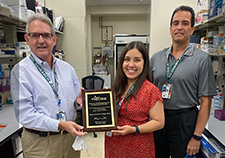Office of Research & Development |
 |
Office of Research & Development |
 |


Dr. Jeffrey Whittle meets with a PREVENTABLE study participant at the Milwaukee VA. (Photo by Ben Slane)
May 11, 2021
By Tamar Nordenberg
For VA Research Communications
"“We can’t assume, based on studies in younger people, that simply lowering cholesterol in older adults means they will have fewer cardiovascular events or experience an overall benefit.” "
Doctors are frequently asked by patients, “Should I be on a statin?”
For older patients without heart disease, VA physicians Dr. Jeffrey Whittle and Dr. Jacob Joseph—like many of their medical peers—wish they could respond with a simple “yes” or “no.” But so far, most research on statins—drugs used by millions of Americans to lower cholesterol—has focused on middle-aged people, not the elderly.
A major statin study focused on older people is now underway, and 50 VA medical centers across the nation are taking part.
Whittle, a Milwaukee VA internal medicine physician-researcher, and Joseph, a cardiac specialist and researcher with the Boston VA Healthcare System, are both lead investigators on the PREVENTABLE study. The clinical trial is designed to answer whether one statin in particular— atorvastatin, sold as Lipitor—can help older adults stay healthy longer.

VA Study Documents Health Risks for Burn Pit Exposures

VA center training the next generation of researchers in blood clots and inflammation

Could cholesterol medicine reduce dementia risk in seniors?

Million Veteran Program director speaks at international forum
PREVENTABLE is funded by the National Institute of Aging and the National Heart, Lung and Blood Institute of the National Institutes of Health.
Specifically, PREVENTABLE is looking at whether taking atorvastatin can help adults aged 75 and over who do not have cardiovascular disease live better by preventing dementia, disability and heart disease.
“The question is so important, for both older people generally and older Veterans specifically,” says Joseph, a member of PREVENTABLE’s national study leadership team and principal investigator of a network of 50 VA hospitals involved in the trial.
The VA network is one of 100 health systems represented in the research. VA contributes “fantastic strengths,” Joseph says, such as research expertise, a huge and generous patient population of prospective volunteers, and a sophisticated electronic records system.
With the large number of sites and a plan to include 20,000 participants in the 75-plus age range, PREVENTABLE stands to be among the largest-ever health studies in older adults.
About one in three U.S. adults over age 75 without heart disease are taking statins. The drugs are known to lower cholesterol and have been shown to benefit younger people by preventing cardiovascular events such as heart attacks. But Whittle strikes a cautionary note about prescribing a drug for older people that has been tested only in younger study participants: “We can’t assume, based on studies in younger people, that simply lowering cholesterol in older adults means they will have fewer cardiovascular events or experience an overall benefit.”
The study will help clarify not only whether statins can maintain health in older adults, but also which older adults should not be taking these drugs. Where there is no benefit expected, taking one less medication could help avoid potential side effects, as well as extra costs.
PREVENTABLE will randomly assign participants without heart disease or dementia to receive atorvastatin or a placebo. Researchers will follow participants for up to five years—testing their memory, thinking and physical abilities and monitoring them for health events, such as heart attacks or strokes.
PREVENTABLE is a “pragmatic study” designed to evaluate effectiveness under real-life conditions, making participation easy for research volunteers. Study visits will be over the phone or in participants’ homes, and additional information will come from electronic health records and Medicare data. The study drug or placebo will be shipped directly to participants’ homes every three months, under the management of the VA’s Cooperative Studies Program Pharmacy Coordinating Center.
Veterans and others who are 75 or older, don’t currently take a statin, and don’t have dementia, a significant disability, or heart disease may be eligible to enroll. The PREVENTABLE website has information to help people decide if participating is right for them. On the site, participants share why they enrolled. One of them, 95-year-old Veteran and retired physician Murray Heimberg, says, “Studies aren’t often focused on older adults, but PREVENTABLE looks specifically at people over 75.”
VA’s Joseph says calls the study “a unique opportunity to leave a legacy for medical science and fellow older adults.” Whittle adds, “Hats off to the VA for hugely advancing evidence and improving care, and especially for Veterans, who have already put their lives on the line and now continue to serve by contributing to research that can have important benefits to society.”
Both doctors emphasize the importance of minority participation in the trial. Whittle recognizes that some people are hesitant to participate in medical trials based on historical wrongs. He says it is crucial, however, to learn how statins affect diverse groups, including people of color, who have often been underrepresented in clinical studies.
“There could be substantial differences in health effects for people of color, based on biology or experiences. It would be tragic if past injustices result in inadequate care because of a continuing lack of evidence in particular groups.”
Whittle’s own mother is in the age group being studied. At 87, she is like many of his patients who, he says, understand that dying is a part of life but are very worried about dementia and disability. They don’t want to become dependent on others. The internist says “tantalizing” evidence exists that older people taking statins may be less likely to develop dementia and disability than those not on statins, but that larger studies such as PREVENTABLE are needed to know for sure.
“Right now,” Whittle says, “we don’t have a medicine we know prevents dementia, for example, but it would be wonderful if we find statins could have this type of health benefit.”
VA Research Currents archives || Sign up for VA Research updates